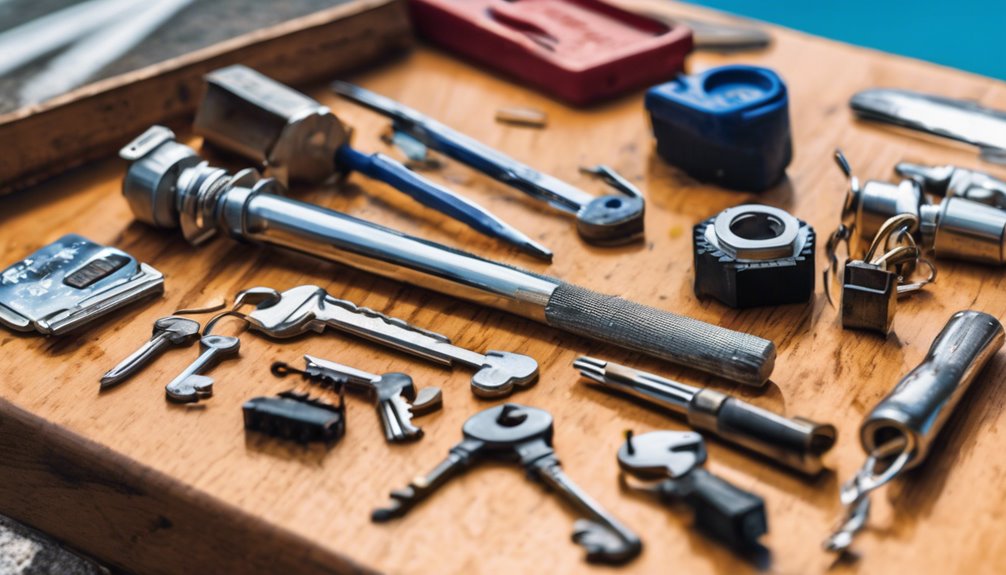Have you ever thought about how crucial locksmiths are in our everyday lives? If you’re considering becoming a locksmith in Florida, you’ll need to navigate a few essential steps to get started. From training programs to local regulations, there’s a lot to cover. Understanding what it takes to succeed in this field can set you on the right path. So, what do you need to know to kick off your locksmith career?
Key Takeaways
- Enroll in vocational training programs for locksmith skills, focusing on key cutting and lock installation.
- Obtain an apprentice locksmith permit to gain hands-on experience in the field.
- Check specific county regulations, as Miami-Dade and Hillsborough have unique licensing requirements.
- Complete a criminal background check, ensuring no felony convictions for licensing eligibility.
- Join the Associated Locksmiths of America for certification and stay updated through industry seminars.
Steps for Becoming a Qualified Locksmith in Florida

If you want to become a qualified locksmith in Florida, the first step is to explore local vocational training centers that offer locksmith training courses. These courses will teach you essential skills like key cutting and lock installation. Once you’ve completed your training, consider applying for an apprentice locksmith permit, allowing you to gain valuable locksmith experience under a licensed locksmith. It’s also wise to register with the Associated Locksmiths of America to pursue locksmith certification, which boosts your credibility in the field. Don’t forget to undergo a criminal background check, as this is vital for meeting the character requirements. Staying updated on security systems through seminars and industry events will keep your skills sharp and relevant.
Licensing Requirements for Locksmiths in Florida
In Florida, becoming a locksmith involves understanding both statewide guidelines and specific county requirements. While no formal state license is needed, counties like Miami-Dade and Hillsborough enforce their own rules, including background checks and insurance mandates. It’s essential to familiarize yourself with these regulations to guarantee you’re compliant and ready to work.
Statewide Licensing Overview
While Florida doesn’t require a formal statewide license for locksmiths, it is crucial to understand that specific counties like Miami-Dade and Hillsborough have their own regulations you must follow. In Miami-Dade County, you need a valid county-issued locksmith license, complete a one-year apprenticeship, and pass a criminal background check. Hillsborough County has its own set of licensing requirements, including commercial general liability insurance of at least $500,000, background checks for both business owners and employees, and a notarized affidavit confirming the accuracy of your application. Additionally, while locksmith training in Florida typically costs between $600 and $1,000, keep in mind that these expenses are separate from the licensing fees required by your county.
County-Specific Requirements
Understanding county-specific requirements is essential for anyone looking to work as a locksmith in Florida. In Miami-Dade County, you’ll need a valid county-issued locksmith license, a criminal background check, fingerprinting, and at least one year of apprenticeship experience. Licensing fees here include $32 for an apprentice locksmith permit and $42 for a certified locksmith, plus extra charges for background checks and late renewals. Meanwhile, in Hillsborough County, both business owners and employees must undergo background checks and submit a notarized affidavit, along with proof of commercial general liability insurance of at least $500,000. Remember, displaying your locksmith ID card while working and adhering to renewal timelines for your licenses is vital in both counties.
Criminal Background Checks
To work as a locksmith in Florida, you’ll need to navigate the licensing requirements, which prominently include criminal background checks. In regulated counties like Miami-Dade and Hillsborough, no felony convictions are allowed for applicants seeking a locksmith license. You’ll need to submit character certificates, typically involving police background checks, to demonstrate your moral character. These checks are mandatory not only for business owners but also for all locksmith employees in Hillsborough County. If you fail to pass the criminal background check, you won’t be able to obtain the necessary permits to operate legally. So, it’s vital to guarantee your background aligns with the standards set by Florida’s licensing authorities before you start your locksmith journey.
Training and Educational Opportunities
When you’re looking to become a locksmith in Florida, exploring local training programs is a great place to start. Although options may be limited, schools like the School of Lock and Penn Foster College offer valuable courses. You might also consider apprenticeships, which can provide real-world experience under the guidance of seasoned professionals.
Local Training Programs
If you’re looking to become a locksmith in Florida, you’ll find various training programs that can set you on the right path. While local locksmith schools may be limited, options like the School of Lock and Penn Foster College offer courses in locksmithing principles. These training programs typically last from a few months to a year, covering essential skills such as key cutting and security system management. You can also explore online locksmith training for a flexible learning experience, often completing within two months at around $800. Additionally, community colleges and vocational schools might provide certification programs and continuing education workshops to keep your skills sharp and up-to-date. Embrace these opportunities to kickstart your locksmith career!
Apprenticeship Opportunities
Apprenticeship opportunities are essential for aspiring locksmiths in Florida, offering a pathway to gain hands-on experience and crucial skills. Typically, you’ll need at least a year of training under an experienced locksmith. While local vocational schools and community colleges may offer locksmith training programs that include these apprenticeships, options can be limited. Engaging in an apprenticeship helps you master key skills like lock installation, key cutting, and troubleshooting security systems from industry professionals. Many programs also provide certification, boosting your employability and credibility. Don’t forget the power of networking; connecting with established locksmiths at industry events can uncover valuable apprenticeship opportunities and forge mentorship relationships that can guide your career journey.
How to Start Your Own Locksmith Business

Starting your own locksmith business in Florida can be a rewarding venture, especially given the increasing demand for security services. To begin, you’ll need to develop a thorough business plan outlining your services, target market, and operational strategy. Register for business taxes and open a dedicated bank account to manage your finances legally. Don’t forget to acquire the necessary permits and licenses—especially in regulated areas like Miami-Dade and Hillsborough Counties. A successful locksmith also understands the importance of a strong online presence; invest in a professional website and digital marketing to attract customers. Finally, continuously improve your skills through locksmith training in Florida, ensuring you stay ahead in the industry and build a reputable locksmith company.
Career Opportunities and Job Outlook for Locksmiths
As the demand for skilled trades continues to rise, locksmithing offers a variety of career opportunities across Florida. While the overall job outlook shows a slight decline of 2% from 2022 to 2032, there are still about 1,700 job openings each year due to retirements and changes within the industry. The average locksmith’s salary in the U.S. is around $46,240 annually, with increased earning potential available through specialization in electronic locks and security systems. Continuous education is essential for you to stay competitive and adapt to evolving technologies. With a solid foundation in locksmithing, you can enjoy a fulfilling career in residential, commercial, or automotive sectors, making a meaningful impact on your community’s security needs.
Tips for Success in the Locksmith Industry

Success in the locksmith industry hinges on several key strategies that can set you apart from the competition. First, commit to ongoing education by attending seminars and training events, enhancing your skills as a skilled locksmith. Next, focus on customer service; building trust with clients leads to repeat business and referrals. Establish a strong online presence using effective marketing strategies like SEO and social media to grow your locksmith business. Don’t forget to stay informed about local regulations and licensing requirements to maintain compliance. Additionally, network within the locksmith community for mentorship and support, gaining insights from experienced professionals. By embracing these tips, you’ll not only thrive but also enjoy a fulfilling career in the locksmith industry.
Frequently Asked Questions
How Long Does It Take to Become a Locksmith in Florida?
It typically takes you about 1 to 2 years to become a fully trained locksmith. You’ll start with a training program, which usually lasts 3 to 6 months, and then gain hands-on experience through an apprenticeship that can span from 6 months to 2 years. While some basic skills can be learned in as little as 2 months, continuous education is key to keeping your skills sharp as technology changes.
How Much Do Locksmiths Make in Florida?
Locksmiths in Florida typically earn between $40,000 and $50,000 annually, depending on experience and specialization. If you’re just starting out, you might see salaries around $30,000 to $35,000, but as you gain experience, you could earn over $60,000. Your earnings can also vary based on the services you offer, with automotive locksmiths charging between $75 and $200 for lock services. Location and demand will further influence your potential income.
Do I Need a License to Be a Locksmith in Florida?
You don’t need a statewide license to work as a locksmith in Florida, but keep in mind that local regulations vary. In places like Miami-Dade and Hillsborough Counties, you’ll need specific licenses, which often require background checks and apprenticeship experience. If you’re just starting, obtaining an apprentice locksmith permit is essential. Plus, having certifications from organizations like ALOA can boost your credibility and help you gain trust with clients.
Is It Worth Training to Be a Locksmith?
Training to be a locksmith is like opening a door to new opportunities. With costs ranging from $600 to $1000, it’s an affordable investment in your future. You could earn between $40,000 and $50,000 annually, providing stability. Plus, as the field grows, your expertise will become even more valuable. By completing a training program, you’ll gain credibility and trust, paving the way for higher-paying clients and exciting advancements in your career.
Conclusion
In the locksmith world, you’re not just turning keys; you’re opening doors to new opportunities. By gaining the right training and experience, you can forge a successful career in this essential trade. Whether you choose to work for a company or start your own business, remember that staying current with industry trends is key. With persistence and passion, you can secure your place in this rewarding field and help people find peace of mind, one lock at a time.








